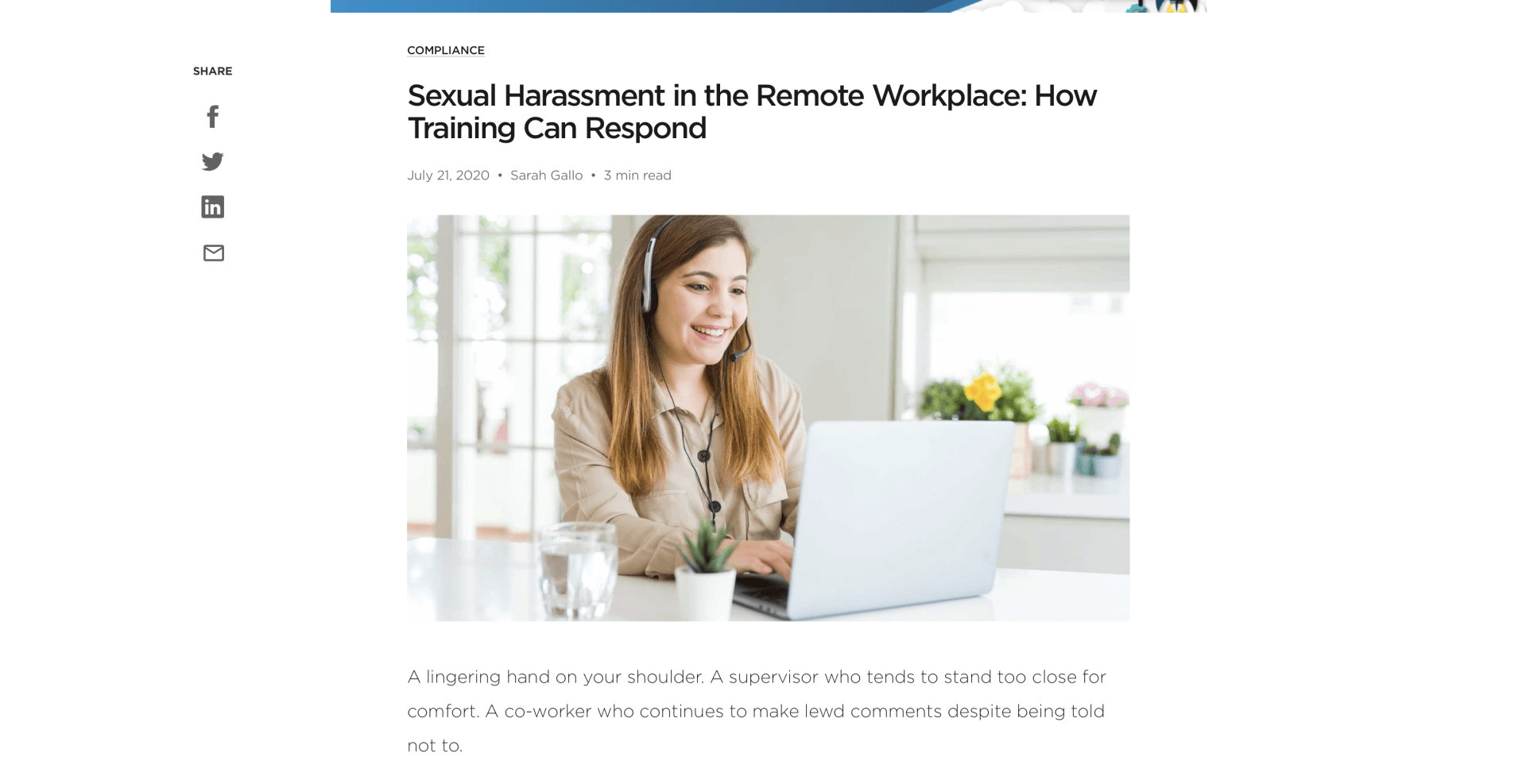Sexual Harassment in the Remote Workplace: How Training Can Respond
Check out the below article from Sarah Gallo and Training Industry from July 21, 2020, where Brigitte Kimichik, Author of Play Nice - Playground Rules for Respect in the Workplace, is quoted:
Sexual Harassment in the Remote Workplace: How Training Can Respond
A lingering hand on your shoulder. A supervisor who tends to stand too close for comfort. A co-worker who continues to make lewd comments despite being told not to.
The tell-tale signs of sexual harassment have become all too clear to employees across industries. But the line between what’s appropriate and what’s not can easily become blurred when working remotely. After all, working from home “tends to “take on a more casual tone,” says Brigitte Gawenda Kimichik, JD, author of “Play Nice: Playground Rules for Respect in the Workplace” and a recently retired attorney. This “decrease in formality,” she says, can hinder workplace civility, professionalism and accountability, all of which contribute to a culture that tolerates harassment.
Let’s evaluate how training can help cultivate a virtual work environment free of harassment and full of respect.
What Is Digital Harassment?
Many people assume harassment only occurs in a shared workspace, says Edgar Ndjatou, executive director of Workplace Fairness, an employee rights nonprofit organization. “But you don’t have to be in the same place for sexual harassment to happen.”
In remote work, Kimichik says, sexual harassment could include any of the following:
- Inappropriate comments, jokes, pictures or even GIFs sent via email, chat massages or texts.
- Sexual or discriminatory comments made during video meetings.
- Commenting on a co-worker’s appearance during video meetings.
- Emails or text messages requesting sexual favors.
- Stalking on social media.
- Unsolicited and/or inappropriate communications through company messaging apps.
Any behavior that “creates a hostile or uncomfortable work environment” — whether virtually or in person — is harassment, says Carol Cochran, vice president of people and culture at FlexJobs. With many companies operating remotely due to the coronavirus pandemic, it is more important than ever for sexual harassment policies to explicitly prohibit harassment across “all forms of digital communication and media” to account for “all the ways people can interact with each other [virtually],” Ndjatou says. An easily accessible sexual harassment policy lays the foundation for an inclusive and respectful work environment — no matter where the work happens.
How Can Training Help?
Sexual harassment training is notorious for being unsuccessful, with many companies viewing it as a “check-the-box” training event necessary for compliance. Another reason it fails to drive change is because it is often outdated, Ndjatou says. Sexual harassment training must be “aligned with the times we’re living in” to resonate with today’s learners. Kimichik agrees, adding that the more training addresses modern, “real-world examples” of harassment, the more prepared learners will be to recognize — and step in — when it occurs in the remote workplace.
It is important for employees to know what digital harassment looks like. But to foster a truly inclusive and respectful virtual work environment, training should also address:
Civility
According to Indeed, a hostile work environment is “one where an employee’s job is made impossible because of the discriminatory words and actions of a supervisor, manager or coworker,” such as sexual harassment. On the other hand, civil work environments are marked by mutual respect. By training on and modeling civil behavior, leaders can not only help prevent sexual harassment from occurring in the first place but “create a [safer] space for people to speak up” if it does, Cochran says.
To build a culture of civility, learning leaders must provide “explicit training” that covers what civility looks like, describes situations in which employees may act uncivilly, provides tips on how to maintain composure and “affords opportunities to practice behaving civilly in emotionally charged situations,” writes Christine Porath, a professor at Georgetown University’s McDonough School of Business and author of “Mastering Civility: A Manifesto for the Workplace,” in a Harvard Business Review article.
Bystander Intervention
Bystander intervention training equips employees with the tools they need to stop digital harassment in its tracks. Kimichik says that training can help employees become “remote bystanders” by encouraging them to “actively denounce” any disrespectful behavior they encounter, whether by condemning inappropriate comments sent in a group chat or by reporting an email sent by a co-worker containing explicit images.
Reporting Processes
Sexual harassment policies should include “clear direction for reporting any incidents that an individual experiences, witnesses or is otherwise aware of,” Cochran says. Training professionals should clearly explain these reporting processes so that all employees know how to report sexual harassment and what to expect after doing so.
Learning leaders should also train managers on how to respond when an employee comes forward with a sexual harassment compliant. After all, deciding to report harassment is not easy. It is a calculated decision based on whether or not reporting coming forward is “worth it,” says Ndjatou. Leaders must respond with empathy, first and foremost, before moving forward with next steps.
In many ways, training can empower remote workers with the tools they need to identify, respond to and actively denounce harassment. It also gives them the courage to advocate for nothing less than what they deserve — respect, both on and offline.




